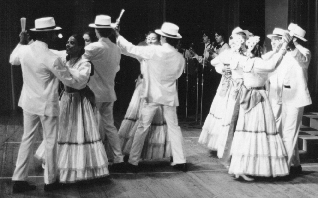
Our History
Puerto Rico today is caught between two diverse cultures and is constantly under scrutiny and judgment of visitors with only a scant understanding of the island and its people. Outsiders and especially mainland Americans will increasingly be called upon to understand Puerto Rico and her unique culture.
Apart from the very obvious difference in the language, many of these cultural differences are harder to specify and quantify than are the formal elements in common just mentioned. At social and cultural levels profound differences do exist between people of different backgrounds.
The Taíno culture was the first influence in Puerto Rican culture but it was Spanish culture which most greatly influenced the island's history until the beginning of this century. When the Spanish forced the Tainos into slavery, virtually the entire indigenous population was decimated, except for a few Amerindians who escaped into the remote mountains. Eventually they intermarried with the poor Spanish farmers and became known as jíbaros. Because of industrialization and migration to the cities few real jíbaros remain. Puerto Rico also has a rich African culture dating from the importation of Africans as slaves by the Spaniards in past centuries. The people of Puerto Rico represent a mixture of races, cultures, languages and religions. They draw their unique heritage from the Tainos, from Spanish loyalists who sought refuge here, from the African slaves and from other Caribbean islanders who came to the island in search of jobs. The Spanish they speak is a mix too, different somewhat from Castillian Spanish, with many words borrowed from the pre-Colombian Amerindian tongue right up to modern-day English.American culture has had a progressive effect upon Puerto Rican culture since 1898 but especially so after the 40's. Some Puerto Ricans are not happy with the result of that influence; others welcome it.
There is an essential dichotomy of Puerto Rico's relationship with the United States. Within American jurisdiction, as reflected by common citizenship, flag, currency and numerous applicable Federal laws, Puerto Rico might seem in everything but name a State of the Union. But on the other side you will find a culture and society profoundly different from that in the mainland. It is a rich and varied culture but a unique one emanating from all those rich influences. This makes Puerto Rico a unique blend of the Spanish-Caribbean "joy of living" and the American drive for organization and forward-thinking.

Puerto Rican Folkloric Ballet, performing a Puerto Rican Danza.